October 31, 2005
Who?

Who could this be?
It could be Harriet, suffering, after being dropped like a hot potato by the smartest man she knows.
It could be Condi, opening her big mouth and telling people what to do to fix their country(ies), cheering because she next in line for the vice presidency,(or more) or crying at Rosa Parks' state funeral
It could be Rosa, horrified that her dead body is being used to distract from news of the exposure of crime in this administration. Horrified that the folks who state openly that they want to overturn affirmative action are using her demise as a photo op.
It could be Laura trying to keep W. sober, when all he wants to do is blot out this whole thing. (She could use a little Al Anon. Yelling at the addict doesn't work. Detach with love. She really can't do that right now, though, since someone has to
It could be Edith, eager to put women back in their proper places, passed over once again, for one of those white males.
It could be Dakota just wishing you a Happy Halloween
Photo note: Not my shade of lipstick, thank you very much.
October 30, 2005
Chicory

Big Baby: See, it's not just me who likes flower pictures -- that lady wanted more.
Higher Self: Very well, then, let's try to make this an educational experience. What kind of flower is this dear?
Big Baby: Chicory. It's blue and it grows everywhere in vacant lots, in cracks in the sidewalk, along the roadside, all summer long.
Higher Self: It's simply ubiquitous.
Big Baby: (imitating our favorite, helium) Ubiqqqqqqqqqqqquitoussssssssssss.
Higher Self: When coffee is in short supply, chickory is often used as substitute or additive, even though it has no caffeine. The chicory root can be dried, roasted, ground, and brewed. Chicory is what makes New Orleans coffee so yummy.
Big Baby: So what?
Higher Self: One never knows when Starbucks might not be open. Knowing how to find your own coffee in the fields might come in handy. (soto voce) We hate to dwell on you-know-what in front of the children .
Big Baby: I HATE the taste of coffee.
Higher Self: Then you can just pick the flowers dear.
Photo note: For some reason, perhaps the light of predawn, this is a bit more luminous than one might ordinarily find in nature. Around here, we need all the luminousity we can get.
October 29, 2005
The Pumpkins Speak, - It Is for Us to Understand

A simple pre Halloween greeting to all of you!
If we were so inspired, we could consider the shot from a metaphorophotographic viewpoint, as well.
Three pumpkins sit prominently on a stand at the lowest level of the picture - one, particularly squat, in front of a deep shadow. The letters KR are carved on the back (just kidding). The Gourds are looking down upon the pumpkins from from above. I like to think of their expressions as disapproving, but that would probably be anthropomorphizing, rather than metamorphizing. Although it seems like the shot is loaded with triangles, it really isn't-- but it does have light, shadow and many shades of gray. And then there's quite alot of blue sky.
Interpretation: It's hard to know whether Rove and Cheney will be offically charged for their roles in the Plame outing, and indicted along with Libby. We're counting on the gourds and the blue sky, and shouting a hearty third of a Whoopie!
Photo note: This is the same stairway , last year
October 28, 2005
Last Rose of Summer

Big Baby: Pretty please with sugar on top, can't I have a flower picture. I'm sick sick sick of talking about sick sick sick. Besides, there won't be any more flowers for a long time, unless they're store bought or plastic.
Higher Self: Yes dear, you have been very patient. You have hardly interfered with my civic responsibilities lately, except for that temper tantrum the other day. But you did a good job pounding on the drum and yelling "SUFFER SUFFER SUFFER". We shall have to do it the next time you feel upset with a narcissist. It worked very well. .
Big Baby: I'm good at pounding.
Higher Self: Yes you are, and we prefer that you do not do it on the body.
Big Baby: Halloween's Monday. Do I have to wear a contamination suit? Can't I go as something pretty, like a drop of blood?
Higher Self: We'll see, dear. Now here's your flower picture, aren't you happy?
Big Baby: (beginning to jump up and down and flail) Drop of Blood Costume, Drop of Blood Costume, I want a Drop of Blood Costume!
Higher Self: We'll think about it darling. (soto voce) Honestly, I just don't know where she gets these grizzly ideas.


View larger image View larger image
Photo notes: Took the flower shot yesterday in the cold rain. Had to drive around the block twice for a reasonable, though still imperfect, view of the Blood Drop, which I presume was an American Red Cross public relations effort. Wonder how well it worked? Maybe they have an bacteria costume in their closet. I never thought to try the subway station for avian flu information distribution. I must keep in mind that IT'S NOT MY JOB.
October 27, 2005
The Ethics of Tamiflu Ownership

Much has been written about the making of moral decisions, and moral development. There is the famous academic disagreement between Lawrence Kohlberg and Carol Gilligan in which Gilligan challenged Kohlberg's theoretical heirarchy of moral behavior based on the value of justice (and research done almost exclusively on white males) by arguing that women base their moral judgements on the value of care instead, and therefore differ significantly from men, but are no less "developed". More recently, others have studied cross cultural moral decision making, and the possibility that moral behavior is biolologically based, summarized beautifully in a piece (well worth reading if you have the time) by Rebecca Saxe, called " Do the Right Thing".
Peter Sandman has elucidated the dilemmas that come with ordering one's own tamiflu. In lieu of doing a lick of work myself, I have, once again, blatantly, copied this interchange, directly from his site:
Adrienne, a local public health officer, wrote to Dr. Sandman on October 12, 2005:
"I have a concern about your suggestion to individuals to get a prescription for Tamiflu or Relenza now before supplies run out.
If everyone does so, there will be no medicine for those who may need to be treated this fall/winter for the run-of-the-mill flu, even if there is no pandemic. There may be thousands of doses sitting in people’s medicine cabinets just in case of a pandemic, but none for vulnerable people who may need it for treatment or prophylaxis within the next few months during the normal flu season which will definitely occur.
While the prospect of a pandemic is very frightening, and I can understand why people and physicians would want to stockpile some Tamiflu to protect themselves and their families, I would also want it to be available to sick or exposed vulnerable people this flu season and to critical service providers in case of a pandemic.
If I cannot support everyone taking this approach because of its negative impact on the health of individuals and groups, I cannot in good conscience prescribe Tamiflu for myself and my family.
I agree with you that the focus on antivirals and vaccines, which are unlikely to be available if a pandemic occurs soon, is detracting from other important planning efforts at the local level.
Thank you for your many useful and stimulating comments on pandemic influenza."
Dr. Sandman answered:
"I think you’re right. Any treatment course of Tamiflu (or Relenza) that’s sitting on someone’s shelf waiting to be needed isn’t going to be available to someone else who needs it already. Of course this is also true of a can of soup; there are hungry people right now who would have use for what I’ve stockpiled in my kitchen. But there’s no sign that the supermarkets are running out of soup, whereas the drugstores are very likely to start running out of Tamiflu soon. So many of my friends share your view that we should let the available Tamiflu remain unallocated, so it will be there for the first people who get sick and need it.
On the other hand, there hasn’t traditionally been much Tamiflu use for the annual flu. It needs to be taken within 48 hours of the onset of symptoms, which isn’t much time to get in to see your doctor — and many people with the flu don’t see the doctor for it at all. And most doctors (and patients) haven’t been all that interested in a drug that cuts the duration and severity of a disease most regard as an inconvenience, not a threat.
Moreover, Tamiflu for the annual flu is a little like the morning-after pill. People worried about the annual flu are supposed to get themselves vaccinated. Their ethical claim on Tamiflu if they neglected to get vaccinated seem less compelling to me than the claim of someone worried about a potentially pandemic flu strain for which there is no available vaccine. (Of course there are also people who couldn’t get vaccinated, or whose vaccinations didn’t take.)
The more common argument against personal stockpiles is that they diminish the supply available for a communal stockpile. Wouldn’t it be best for the government to centralize all the Tamiflu and, in the event of a pandemic, distribute it to those who need it most? Or, as is likelier, to those we most need to keep healthy?
There is truth in that one too, even though Roche claims its supply chain for individual prescriptions and its supply chain for government bulk orders are independent. (I don’t know if I believe that.) Of course the federal government has had at least as much forewarning as the rest of us; it ordered as much Tamiflu as it decided to order, presumably leaving the rest for you and me. And if state and local governments decide to commandeer the remaining Tamiflu supply (as they commandeered the flu vaccine supply last summer), they will. They haven’t yet.
Six months ago I argued that individual orders of Tamiflu were a double good: Not only did you get your Tamiflu, you also built the demand and thus the incentive for Roche to increase production capacity. By now I guess Roche has all the incentive it needs. So the question is straightforward. If you get your own Tamiflu now, your chances are better of having it available if you or someone you love gets the flu — whether it’s the annual flu or a pandemic flu. If you don’t get your own Tamiflu now, there will be that much more available for someone else to stockpile, or for the government to nationalize and allocate, or (your hope) for someone who already has the annual flu to start taking.
I respect, even admire, those who choose to forgo the chance to protect themselves now in the hope that someone else will be able to meet an imminent need instead. I nonetheless urge my family and friends to protect themselves now.
There’s also an interesting middle ground to consider. Small groups of friends and neighbors might be able to develop a shared stockpile. This would lessen the chances of a dose sitting unused on a shelf, while still freeing the participants from dependence on a very chancy government supply. Of course the issues of trust and equity could get hairy!
The ethical issue for the prescribing physician is a little different. Assume you believe that public health is best served by denying your patient a Tamiflu prescription, leaving one more treatment course in the communal pool, available for people who are already sick or whose health is especially important to protect. But you also know your patient’s health — the patient sitting in your office right now — is best served by providing the prescription, so your patient can be prepared if he or she gets the flu after there is no Tamiflu to be had. To whom does the doctor owe a higher duty: the doctor’s vision of what’s best for the general public or the doctor’s knowledge of what’s best for the individual patient? I’d have thought it was the latter, but I’m neither a physician nor a medical ethicist.
Despite all of this, the most important bottom line is personal morality. If getting (or prescribing) Tamiflu seems unethical to you, don’t do it."
Because supplies of Tamiflu are extremely limited, you must make your moral decision soon, or it will be made for you. Should you decide to purchase Tamiflu, it is still available on line without a prescription. Of course there is much more to personal preparedness than simply acquiring antiviral drugs. And when you finish that list, think about what you can do in the larger community.
Photo note: Is it on or off the hook? Ironically, the building belongs to Harvard, where Kohlberg and Gilligan did their thing.
October 25, 2005
Empty Chairs

Looking down
into the
colorless pit
empty chairs
stacked
for the night
I am reminded
of my current
lack of inspiration
if I were
on a roll
I would be
writing
bad poetry
about
the empty
chairs
soon to be
seen in the
Bush cabinet
I hope
but
sometimes
little old ladies
just need a rest
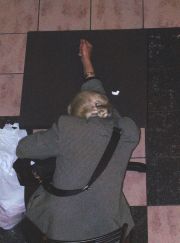
Photo note: I am embarassed to say that while I was shooting down from the balcony, another, more compassionate, member of my party went to check and see if this woman was all right. She was just waiting for a friend.
October 20, 2005
Social Distancing
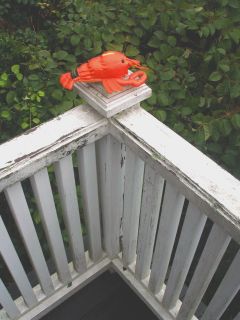
In my forays into Avian Flu Lit, I stumbled across a term that is new to me, but probably not to epidemiologists -- "social distancing". I find it a kinder, gentler way to introduce the concept of a voluntary quarantine. Quarantine has such hideous, jarring visual associations. Whereas, social distancing, sounds more like an uncocktail party .
As a child of the '50s, I vaguely remember polio, and it's effect on my limited social life. Staying away from crowded places, particularly in the summer, was the rule of thumb. I do know that I was taken to concerts and the movies. I remember seeing "Song of the South", most notably because the child standing in front of me in the long line, vomited. That was definitely a crowded place, but it was winter. By the way, I didn't catch anything from her, but I certainly felt like vomiting myself.
In searching for more information on the etiology of the term "social distancing", I came across a poster from the Potomac Institute - maybe that's the thing to distribute on Halloween. Social distancing, it seems, is a very popular, rather obnoxious, practice among teenagers. It is also what people do to lesbians.
Then again, there's always martial law
Photo note: I took this shot after a family member told me that the cardinal I had been chasing from window to window for half and hour with my camera was on the back porch. Note the many triangles, and all the black mold and peeling paint that will have to be looked after in the spring.
October 19, 2005
Knowing My Place

I found
the place
a room
of my own
a studio
a retreat
a lofty
architectural wonder
in an old church
just right
for a
woowoo
wannabe
in which
I can
social distance
to my heart's
content
since it is
three
hundred
thousand
dollars more
than I have
to spend
I shall
have to
ask for it
from the
universe
for my birthday
which is
today
really
Photo note: Out the window of the one bedroom unit. The vista, I must admit, is compromised.
October 18, 2005
Making connections

Yesterday I had lunch with my friend who just returned from volunteering for a week in Gulfport, Mississippi. She was particularly impressed by the North Carolina Baptist Men (once she got over their name). She said they were, forgive the phrase, a godsend. The Men have outfitted trailers that they drive to disaster areas. In additon to "feeding units" , they have one that is fitted with six showers each for men and women (no coed showers, understandably). Another trailer has a bunch of washing machines and dryers which are manned and operating twenty four hours a day, so that volunteers and victims can have clean clothing. Let the North Carolina Baptist Men stand as a shining example of the kind of cooperation, planning and mutual regard that is needed in communities when preparing for the possibility of a pandemic.
Peter Sandman writes that we must focus on much more than pharmaceutical interventions when planning for a pandemic. Here are but a few of his suggestions:
". Manufacturers and service providers can rethink their inventory control procedures. What will they be able to provide for themselves if their usual supplier can no longer make it or ship it? What can they do without in a pinch? What do they need to stockpile?
. Every organization can rethink its staffing needs. How can we get essential tasks done despite soaring absenteeism? What sorts of cross-training now might save the day later?
. Every organization can rethink its social contact needs. Infectious disease transmission is a function of the number of social contacts — keeping people home more means keeping more of them alive. What jobs can shift to telecommuting? How can we educate children without making them come to school? How can we distribute food without making people come to the supermarket or the soup kitchen? Should we redefine “delivery person” as an essential job that qualifies for prophylactic antivirals?
. Nonprofits can start planning to coordinate volunteers. Like any emergency, a pandemic will yield huge numbers of people who want to do something to help — including many who contracted pandemic influenza and survived, and are therefore immune. Who is going to sort them out and get them where they’re needed most, doing high-risk jobs that don’t require special skills (washing linens at the hospital, for example, or making deliveries to people sick at home)?
. Local governments can ask themselves hard questions about leadership and survival. How will they keep essential services (police, fire, water and sewerage) operating? What inessential sources of infection (movie theaters and restaurants, for example) will they want to shut down? Where will they put the bodies when the morgues are full? How will they maintain order?
. What’s left for individuals to do? Inculcate hand hygiene habits now. Figure out how you’ll take care of a sick family member without getting everyone else sick. Stockpile what you’ll need so you don’t need to go out so much. Ask your doctor for a prescription for Tamiflu or Relenza ... and fill it fast, before the drugstores run out. (Admittedly, this is a zero-sum game by now.) Above all, push every organization you’re tied to — your church, your employer, your club, your children’s school — to start its own pandemic planning process."
Australia's Community Resiliance Network which is up and running, is considering ways to implement "social distancing" effectively. Social distancing means keeping folks apart during a pandemic so they do not infect one another. Articles consider the implications of closing schools, public gathering and work places, and the possiblitiy of restructuring mortages to allow citizens to take time away from work. Questions are raised like how will physicans practice and pharmacists distribute medicine? Who will care for children during a pandemic when their parents are ill, or, god forbid, dead?
A Resilience Wiki has been created. There are vast holes to be filled, but the structure is there to facilitate connection..
And on a global scale, we might begin to think about curing poverty as a way to stop the emergence of biological threats.
Anyway, as I consider distributing a preparedness flier in my neighborhood on Halloween, and try to decide between doing so in my Big Bird outfit or my Contamination Suit Ensemble, I find myself yearning to be a man and a Baptist, where it would be all organized for me.
Photo note: Shot on a construction site where the pipes are all in place, ready to be connected.
October 16, 2005
Halloween Costume

I found my Halloween costume in a shop window the other day -- trouble is, it's a little small. You cannot see the American flag sewn across its heart, since I opted instead, for metaphorophotographic reasons, to capture the Lone Star cowboy outfit on the right.
As my own little Halloween public information service, I had been planning to go to house to house through the neigborhood dressed as Big Bird (which allows for excellent anonymity), strewing avian flu information from my plastic pumpkin, like a a flower girl at a wedding strewing rose petals. But a contamination suit, with goggles, nanomask and rubber gloves, I think, will be more educational. I assume I will still be unrecognizable.
When discussing this with a friend, she suggested I stitch up a costume replica of H5N1, reminding me that Bruce Sterling had once published a rather vivid description of a bacteria, that I could utilize when designing my outfit. It's well worth the read, and will inspire you to improve your hygiene if nothing else.
That reminded me of Bruce Sterling's dystopic novel, "Distraction", which I, with my delicate sensibilities, found sordid. It is errily prescient, and very funny , complete with political buffoons from Texas and Louisiana, where much of the novel is set. Not a bad love story either, if you go for that sort of thng in your science fiction.
October 13, 2005
New to Avian Flu? - Where to Start Your Preparations
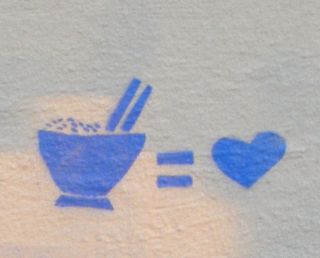
A dear friend from my ladies group (where we are praying for the earth, however ineffectively) called yesterday. She started reading my blog about the avian flu, as media coverage has increased, and she wanted to talk to me in person, since she was experiencing preparation overload/whelm. I think she would qualify as a "newbie" in Peter Sandman's words.
So I decided to write a bare minimum prep list, to ease people into the more complete and obsessive version.
First, kick back with a glass of red wine while you're reading -- that is, if you're over 21, or mature enough to be taking an active stance around this issue. You have just done yourself the favor of introducing resveratrol into your system. Resveratrol is an antiviral. Resveratrol is found in red wine. Have a glass every day until you catch the flu, then alcohol is not recommended. Maybe you want to run out and buy a case of two of your favorite flavors, when you have a minute. Or you could have it delivered. I'm getting way too chatty. I'd better put down my own glass, and get back to work. Here is what I'd gather for a start, assuming that essential services will be interrupted, and you might be stuck in voluntary quarantine for three weeks or more.
Note: the clickies are just for saving time -- mostly places where I've ordered stuff. Feel free to do your own research.
MEDICINE -(antivirals, immune system boosters, symptom relievers, herbal remedies)
. Order Tamiflu or Relenza (on line NOW) if you can afford it, and feel it is morally correct to have it. Ideally you need 30 per person, the usual dose is 2 per day for 5 days, beginning as soon as you have symptoms. Thirty pills are recommended in case the flu sweeps by a few times. You must order now, supplies are very, very short. You can try to get your doctor to write a prescription, but most know nothing about pandemic possibilities, the severe shortage of tamiflu, and are reluctant to give you one. Say you're planning a trip to Indonesia.
. Wheedle at least a month's supply of the current prescription medications you are taking from your insurance company, primary care doctor or HMO. Cry Katrina! Rita! lawsuit! If all else fails, pay for it yourself at an on-line pharmacy.
. While you're at the drugstore stock up on toiletries, ibuprofen, tylenol, cough medicine and theraflu, so you won't have to make a trip later to a place where sick people and their relatives are likely to congregate.
WATER
. Just go get 30 or 40 gallons of spring water at the market, or have it delivered - you can always work on boosting your supply later
FOOD
. Order a case of of MRE's (scroll down to find the flavors --the boys from Louisiana in Iraq recommended the jambalya) Buy some treats at the market that don't need refrigeration (like leftover Halloween candy), or, in lieu of treats, perhaps some antidepressants.
COOKING
. It will be important to be able to boil water without electricity, at the very least (for sanitation, rehydration and Starbucks addictions) so have a campstove and fuel supply. A portable Coleman, a single burner backpacker , a hurricane sort that hooks up to your BBQ propane tank, a cord of wood, a coal stove, a big green egg. I think it might be odious to boil water in a solar oven , but it's worth a try in a pinch
HEATING
. I haven't solved this one yet. Rent a remote cabin in a warm climate. Polar fleece your wardrobe, accumulate down comforters. There are indoor butane heaters on the market, woodstoves and fireplace inserts, but they all require replacement fuel, and probably won't last very long. If there is no electricity, your furnace won't work, even if you have fuel oil.
OFF THE GRID ENTERTAINMENT
. Think three weeks to three months with interrupted electricity. No internet , no DVDs after your battery goes dead. Books, puzzles, arts and crafts, therabands for isometric exercise whatever turns you on without electricity.
LIGHT
. Flashlights, a camping lantern, lots and lots of batteries, or buy the kind you can shake or crank. Candles are for romance, not reading.
INFECTION PROTECTION
. Alcohol wipes/ gel
. swim goggles that seal around your eyes
. face masks (3M 95N respiratiors or nanomasks)
. rubber and vinyl gloves.
. household bleach with spray bottles in which to dilute it to 10% solution and spritz everything that comes in contact with the outside.
. hand soap (not antibacterial)
. laundry detergent
. paper plates
DOWNLOAD AND PRINT OUT
. Dr Grattan Woodson's "Preparing for the Coming Influenza Pandemic" from Fluwiki
START DEVELOPING GOOD HYGIENE HABITS
Photo note: This faux is stenciled in a number of places between MIT and Harvard, I am assuming by a homesick Asian student. Siimplicity itself.
Photoprescience

dead chickens
falling from the sky
a mutant egg
old photos
shot before
avian flu
came into
focus
then
merely
a glitch
in my
unconscious
mind
or
a shadow
in my
crystal
camera

Photo notes: The original entries
October 12, 2005
Avian (flu) in the (spot) Light

With more of a media spotlight on avian flu, Dr. Peter Sandman, an international risk communication expert, has written an excellent article entitled "The Flu Pandemic Preparedness Snowball", cautioning us against relying on medical solutions to a pandemic, should it occur. He reminds us that expensive antiviral medicine is not a viable option for much of the world, and of the meaning of "pan" in pandemic (when almost everyone, almost everywhere is affected)
You should read the whole article, in fact you should read his whole website, Risk = Hazard + Outrage, but, in consideration of your heavy schedules, I am, once again, blatantly copying large chunks of some of his salient points for your perusal. Sorry Dr. Sandman, I guess.
He advises:
1. Be nice to the newbies.[those who are just waking up to the pandemic possibiliy, drop the smug ]
2. Watch out for people’s adjustment reaction — and the authorities’ adjustment reaction.
3. Focus less on the pharmaceutical fix.
4. Focus more on worst case scenarios.
5. Focus more on non-medical preparedness.
6. Focus more on non-governmental and local preparedness.
7. Focus more on worldwide preparedness.
8. Get clear on the “pan” in “pandemic.”
9. Get clear on the “pre” — and the “maybe” — in pandemic preparedness.
And more:
. Manufacturers and service providers can rethink their inventory control procedures. What will they be able to provide for themselves if their usual supplier can no longer make it or ship it? What can they do without in a pinch? What do they need to stockpile.
. Every organization can rethink its staffing needs. How can we get essential tasks done despite soaring absenteeism? What sorts of cross-training now might save the day later?
. Every organization can rethink its social contact needs. Infectious disease transmission is a function of the number of social contacts — keeping people home more means keeping more of them alive. What jobs can shift to telecommuting? How can we educate children without making them come to school? How can we distribute food without making people come to the supermarket or the soup kitchen? Should we redefine “delivery person” as an essential job that qualifies for prophylactic antivirals?
. Nonprofits can start planning to coordinate volunteers. Like any emergency, a pandemic will yield huge numbers of people who want to do something to help — including many who contracted pandemic influenza and survived, and are therefore immune. Who is going to sort them out and get them where they’re needed most, doing high-risk jobs that don’t require special skills (washing linens at the hospital, for example, or making deliveries to people sick at home)?
. Local governments can ask themselves hard questions about leadership and survival. How will they keep essential services (police, fire, water and sewerage) operating? What inessential sources of infection (movie theaters and restaurants, for example) will they want to shut down? Where will they put the bodies when the morgues are full? How will they maintain order?
. What’s left for individuals to do? Inculcate hand hygiene habits now. Figure out how you’ll take care of a sick family member without getting everyone else sick. Stockpile what you’ll need so you don’t need to go out so much. Ask your doctor for a prescription for Tamiflu or Relenza ... and fill it fast, before the drugstores run out. (Admittedly, this is a zero-sum game by now.) Above all, push every organization you’re tied to — your church, your employer, your club, your children’s school — to start its own pandemic planning process.
The clickies in the last paragraph are mine, NOT Dr. Sandman's. Sorry again, just thought I'd slip them in.
Photo note: That heron is still hanging around -- this time in a little more light.
October 10, 2005
Filling in the blanks
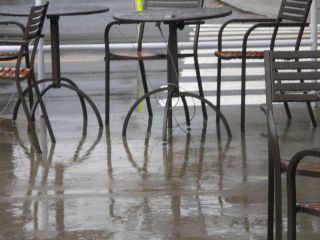
Forgive me for dashing copyright law (or something) to smithereens here, but there was a most informative article in the New York Times that I knew would be completely unavailable for webly public consumption in ten minutes unless I copied it outright, thus providing a way of adding the link reliably to my New and Improved List for Surviving the Avian Flu. It's doubtful that you will be fleeing anywhere in the case of a pandemic, but you may be dying, so you might as well have your ducks in a row. And then again, there may be a flood or an earthquake the way things are going, so, on that cheery note, here is the article, in its entirety:
How to Prepare for One Really Quick Getaway
By DAMON DARLIN
What is the first thing you will grab from your home if your house floods, catches on fire or comes tumbling down in an earthquake? Family photos? The pets? The Hummel figurines?
It probably will not be your financial and medical records, the very things you will need to rebuild your life after a disaster. If you are like most people, you have documents stashed in various places throughout your home, perhaps some under lock and key. And with your mind racing as danger hits, you are not going to have the time or wherewithal to figure out which ones you need.
In any case, your financial and medical records would be such a large and unwieldy pile that you would just say forget about it, grab Fluffy and scramble out of there. Indeed, that is probably your reaction any time someone suggests you get your records organized.
But wait. Do not run away yet. New technology is making this tedious task less odious, and surprisingly, it is not that expensive.
All told, you can secure your records in a weekend afternoon. Even better, doing all this has a wonderful side effect: it can put you in better financial shape to survive a disaster because you will end up a lot smarter about how you spend and save money. For instance, one of the first things to do is compile a list of where everything is - account numbers and the locations of important documents. The list will help you or anyone in your family locate things you need for the insurance adjuster or relief worker. (See below)
This is really the "if hit by a bus" list that financial planners have been recommending you compile for your heirs. If you think of the list that way, you will be reminded of your mortality and you will not want to write it. But think of the families displaced by Hurricanes Katrina and Rita or by California wildfires, and the psychological barrier collapses. The list becomes a much easier sell now, said Brent Neiser, a director for the National Endowment for Financial Education. "It forces you to think," he said.
Here is what else you have to do to protect your records and yourself:
RECORD: Once you have made your basic list, save it on a U.S.B. flash drive. A 256-megabyte drive, which you can buy for $20 or even less if you catch a store promotion, gives you enough space for that file and all the other suggestions mentioned below.
Several of the big flash drive makers, like SanDisk and Lexar Media, are now selling more advanced drives that allow you to encrypt the data so others cannot read it without knowing the alphanumeric key that unlocks the code. Some are even shock proofed with heavier rubber and plastic coatings. Those will cost about $10 to $20 more, but are certainly worth it when you consider the sensitivity of the data on them.
It is also a good idea to copy the contents onto additional drives for backup and for other members of the family.
BONUS: When you are listing the credit cards, also note the credit limits so you will know how much you could spend in an emergency. If your credit cards are at their limits now, you are not going to have any cushion to fall back on. So start paying off balances, beginning with the card carrying the highest interest rate.
SCAN: Some important documents are on paper and you will want copies of them with you: tax returns for the last three years (Form 1040 is all you will need in an emergency), a recent pay stub, birth certificates, marriage license, the deed to your home and insurance policy pages that list your coverage. If you do not have a scanner or a printer with a flat scanner, take the pile of documents down to a copy center like Kinko's to scan. Record the image files on the U.S.B. drive.
BONUS: Take the opportunity to check your insurance coverage for potential disasters like flooding. With homes appreciating in value, you may also find you need to increase coverage.
SHOOT: Some personal finance advisers suggest that you make a spreadsheet listing everything you own and enter the date and price paid and then file all the receipts and ... yeah, yeah. You will never do it. But creating a detailed inventory of everything you own need not be a major chore when technology comes to the rescue. Many households now have a camcorder or digital camera. Walk around each room and take a picture of each item. Then, either store all the photos on a memory card (unless you live in the Biltmore mansion, you can load all the photos on a 256- or 512-megabyte card). Or you can transfer them to the same U.S.B. drive with your other documents.
Describe each object on the camcorder soundtrack or in the file name of the digital photo. Make an extra copy on another card or drive. "If you give one to your insurance adjuster, you go to the front of the line," Mr. Neiser said.
For additional protection, you could upload the photos - as well as all your beloved family photos - to one of the free online photo services like Flickr.com, Picasa.com, Snapfish.com, or Kodakgallery.com. Anybody you choose can then have access to them from any computer anywhere. (Make sure to set the privacy options, though.)
BONUS: You are going to discover a lot of stuff you no longer want or need. Sell it or donate it and take a tax deduction. Intuit, maker of Quicken and TurboTax, sells a $20 program called ItsDeductible that estimates the value of donated items, but Bankrate.com and Salvationarmyusa.org have free valuation guides.
SECURE: Now it is time for your medical records. You can place your health history as well as digitized copies of X-rays, scans and electrocardiograms on the same encrypted flash drive.
Those with serious medical conditions may want to consider a product sold by the nonprofit organization that developed the MedicAlert bracelet 50 years ago. It sells a special USB flash drive on its Web site, www.medicalert.org, called the E-HealthKey for $85. SanDisk originally developed the product for the Army. Pop the flash drive into any computer and a screen flashes with your medical condition to alert emergency room personnel, for instance, to an allergy or your use of a pacemaker. But beyond that screen, medical information you enter with the help of a user-friendly program right on the drive is encrypted.
For an additional $20-a-year fee, MedicAlert uploads your data to its server so you have a backup.
The E-HealthKey is only available for PC's running Windows XP or Windows 2000. You may want to wait until November when the organization issues an improved version.
BONUS: The E-HealthKey software, created by a division of Bio-Imaging Technologies, also plots your weight, cholesterol or anything you regularly record, onto a graph. "It's a great wellness tool," said Ramesh Srinivasan, MedicAlert's vice president for marketing. If you are going to run for your life, clutching your flash drive and the Hummels, you had better be healthy.
THE LIST OF INFORMATION YOU SHOULD HAVE ON YOUR USB FLASHCARD
IN CASE I GET HIT BY A BUS:
Use the space below to enter vital information such as account numbers, PIN numbers and the locations of important documents. Keep this list someplace secure, but where family members can get it quickly. Storing it in an encrypted electronic file on a flash drive is a good idea, as long as family members can recall the password for access.
Account Numbers
Credit Cards (and toll-free numbers):
Bank Accounts (and PIN numbers, passwords and toll-free numbers):
Investment Accounts (and PIN numbers, passwords and toll-free numbers):
Family Social Security Numbers:
Insurance Policies:
Location
Social Security Cards:
Wills:
Living Will:
Power of Attorney:
Deed:
Insurance Policies:
Company Benefits:
Safe Deposit Box Key:
Household Inventory:
THE END of all the purloined material
Thank you Damon, sorry Times, but in sorry times there are those of us who throw our scruples out the window (unlike your own stalwart Ms. Miller) and even order tamiflu , without a prescription, from the internet.
Photo note: The patio at Starbucks in the rain, conveniently located in front of a crosswalk for extra stripes.
October 08, 2005
Journalistic Ethics
j

Gilbert Cranberg, former editor of the Des Moines Register's opinion page, was interviewed by Scott Simon on NPR yesterday about the essay on journalistic ethics he wrote for the Columbia Journalism Review. I tried to transcribe his salient comments from the audio. You will do best to listen for yourself, because my shorthand is rusty.
What Cranberg has to say is crucial, and its neglect has lead to the propaganization of the press, and the development of The Underground Misinformation Network -- Karl Rove to Rush Limbaugh, Robert Novak and, the matyred Ms. Judith Miller being a familiar one. .
Cranberg believes that the press "should just not report opposing allegations or assertions, but try to tell their audience what the truth is."
For about twenty years, The Associated Press Managing Editors Code of 1994 said that a newspapers should "background", with facts, public statements that it knows to be inaccurate or misleading -- that phrase is no longer in their code. It's not in ANY journalism code to Cranberg's knowledge. He doesn't really say how or why it was dropped. Perhaps the corporations that bought newspapers crossed it out when they remade their publications into Tools of the Corporatocracy. I, personally, am reading the New Orleans Times Picayune these days for objectivity.
Cranberg says "You don't mislead, and you try to correct the record." So as not to be identified as a one of the "liberal media", no doubt, he uses the example of a mistatement by John Kerry durng the last campaign.
"If you have a political candidate who is making factually wrong statements [and you report them without truthful background], you have what I call 'The Werner von Braun School of Journalism' --we send up lies and where they land is someone else's problem."
"Verifying the truth, and reporting it, is up to the media, and goes to the heart of the democratic system ..
[As journalists] We have to verify information to to best of our ability, and vouch for the accuracy of it.
Isn't it wonderful that Media Matters and FactCheck are available for truth at our fingertips. Isn't it horrible that we can no longer trust a newspaper to tell the truth. The problem with doing one's own fact checking is that one does not generally rush to fact check one's own political sweetie pies. I, for one, am factchecking all neocons, all the time. If I could trust a newspaper, I might not be so polarized.
Photo note: An autumnal vegemetaphorophoto - I like to think of it as a rather pale and squashy Karl Rove meeting the Presspumpkins. Maybe that's a stretch.
Once again, all flu, all the time

Once again, beating the dead bird, I thought I'd share yet another preparedness list as well as the discussion about ethical dilemmas in disasters from CurEvents, since some of those folks have been thinking about this much longer than I. You might poke around on the website for other good information in your spare time.
Good friends have just returned from two weeks volunteering in Gulfport, Mississippi. They are long time Red Cross folk, but were advised not to wear their Red Cross gear because people are so angry at the Red Cross for their slow response. My friends wrote a heartbreaking, frightening diary which I received yesterday. Then I read The CurEvents commentary from which I quote:
"You might be surprised to learn that TSHTF [don't ask me what that is] has happened dozens, maybe even hundreds, of times in the world's history. It has been common enough to notice certain recurring characteristics. For one thing, it usually takes five to two hundred years. Even when it is caused by a (relatively) sudden event, the people take years to abandon their cities. The fall of Rome dragged on for almost a thousand years.
I say "you might be surprised" because there is an obvious assumption among preppers that there will be some sort of signal, often referred to as "the balloon going up", which clearly indicates the beginning of the end. It doesn't usually happen that way. One characteristic of TSHTF is an "invasion by barbarians", which means people from neighboring countries move in and take over the drudge work of actually running the country. This is also marked by mercenaries, or at least non-citizens, taking over national defense .[note presence of Blackwater Guards in New Orleans] Sometimes there is an actual military invasion, but it is always preceded by an invasion of alien workers. The invasion of the USA has been in full swing for over fifty years now, and the non-citizen enlistments in our armed forces are beginning to be embarrasing. The attempts to get other countries to shoulder some of the load in foreign countries is also a variation of the mercenary example.
At what point in this scenario do you decide to start eating your preps? Do you head for the hills when milk costs $5 a gallon? How about $6? $7? When? Do you shoot your neighbor because you catch him picking food from your garden? What if your Uncle Bob has lost his job and needs a tank of gas to go to another town where he heard someone is hiring? Do you give him the gas, shoot him before he steals it, or leave him stranded where he is? And how are your preps going to help you if this scenario drags on for another fifty years?"
Sounded just like what's happening on the Gulf Coast. And how about the bill to aid oil refineries, shoved through yesterday to shouts on the house floor of "Shame shame shame". Smacks of a third world oligarchy in my book
On a brighter note, you can now purchase your avian flu regalia.Unfortunately, there's nothing that suits my fashion sense . Bumper stickers would be more my style. I must say that I am having second thoughts about mentioning my teeny tiny bit of expertise and my rather larger pile of supplies to anyone. Maybe something more along the lines of a grasshopper costume would be safer .
Photo note: Lord knows, we could use some beauty in the midst of all this preparation. I just remembered, back in my college days, that heavenly blue morning glory seeds were taken off the market because they were being used recreationally . Maybe we should get some for our supply cupboards, since they seem to be available again. In which case, make sure you are among folks with whom you might want to share a hallucination. I thought the chain link fence added just the right amount of irony.
October 06, 2005
Fluish ethical dilemmas

Now that George W., the New York Times, NPR and The National Geographic mentioned the avian flu this week, or as some important blogger put it, "It's all flu all the time", people are not sighing as deeply when I feel a burst of civic responsibility, and bring up the subject.
However, I was abruptly reminded of a potential ethical dilemma this morning, when my dear next door neighbor, who has been yeh, yeh, yehing me for many weeks about this issue, (even after I sent him many friendly preparedness tips) said he had heard something about the avian flu on the radio.
"Finally", I said.
"Yeah" he said "I heard it wasn't going to be so bad."
That's when I lurched through the privet and screamed into the open window of his SUV, "DON'T BELIEVE THEM, you HAVE to be prepared."
He said "Oh no I don't. We'll just come over to your house if things get bad."
Uh huh.
The tale of the ant and the grasshopper ends with the comforting words "Soon the Grasshopper found itself dying of hunger. He staggered to the ants' hill and saw them handing out corn from the stores they had collected in the summer. Then the Grasshopper knew: It is best to prepare for the days of necessity."
Unfortunately, the fable does not speak to the feelings of the ants, peeking out of their ant hill at the starving grasshopper. Are they saying, it serves him right? Or are they saying, we are friends, we cannot let a friend starve, no matter how foolish his decisions have been. The grasshopper didn't have nine year old twins either. Four extra people would tax our supplies mightily.
My neighbor made me promise not to tell his wife, since she has quite a germ phobia . Her twins have tortured her forever by alternatively threatening to touch the toilet seat in restaurants, while she is busy disinfecting for the other. I.am about to break my promise.
At least I have decided what to do about the fact that they have not ordered Tamiflu. Dr. Woodson informs us that in the case of a tamiflu shortage, since it doesn't metabolize, it can be recycled through the urine. He recommends serving it fresh, cooled, with citrus flavoring. I shall deliver ours daily to their doorstep.
Photo note: Since I could not find the plastic ants we used to throw at Passover to symbolize one of the plagues, and, for the first time this summe,r I did not have an army of black ants marching across my kitchen, I resorted to a reduced xerox copy. The grasshopper is a reed sculpture, brought back as a present to me from Thailand, from a person who knows my taste for the bizarre.
Yesterday

Yesterday Tom Ashbrook, host of the WBUR program "On Point" talked to several physicians about the avian flu. I only heard a little of the show, because in the midst of all this impending doom, a friend of mine won the Nobel Prize for Chemistry! Since I was shopping for a fine wine celebration gift, my listening was intermittant .
As a chemist, my friend is very interested in wine. I settled on a Cain Five 2001, whatever that is. It was kept in a locked cooler in the back, into which I have never before been invited. I took Monique's recommendation blindly. If someone gave me a Cain Five, I would probably dump it in the stroganoff.
The only thing my friend has ever told me about chemistry, that I understood and remembered, is that garlic develops different chemical properties when chopped, sliced or crushed, so be certain to follow the recipe instructions in that area exactly.
But I digress. The speaker on my computer is out, so I cannot listen to the show in its entirety, but what little I heard, infuriated me. Tom Ashbrook asked good questions, like "Who decides who gets the two million doses of Tamiflu that the government has stockpiled?" His guest, a physican from Vanderbilt, was vaguely reassuring about that, certain it would be equitable - they're developing a disaster plan at Vanderbilt, which they will follow. He also said there was much more Tamiflu around, when you consider the stock that pharmacies and hospitals keep on hand. Right.
A school teacher called in to say that she doesn't trust the government to handle a disaster like this well, after the last fiasco. She went on to say that, In her experience, everyone sends their children to school when they are sick, and goes to work sick too. Tom responded that perhaps if people are dying, maybe parents will be more judicious. The caller also made the point that allergies are epidemic in the school age population. So far, all flu vaccines are made from eggs. What about all the people who are allergic to eggs? What about the fact that we have killed millions of chickens in an attempt to control the H5N1 virus?
The snippets that I heard from medical experts, in my opinion, were falsely reassuring. A bit insulting in fact. There, there, let's not worry about this too much folks, the death rate may only be 5% (the 1918 pandemic killed 1%, and it was pretty devastating.)
I received this email yesterday too.
Dear DrugDelivery.ca Customer,
We are sending you this email as a courtesy to update you on the current Tamiflu/Relenza/Suspension situation with our company. As you may be aware, we are extremely busy fulfilling several thousand orders from the USA and all over the world, and this of course has caused many concerns over the availability of stock and the arrival date of your order. We hope this email will answer many of your questions.
Question #1 : Why are the phone lines so busy, and why haven't you answered my email yet?
We are receiving on average 3000 emails per day, and over 2500 phone calls. As you can imagine, this is causing a very long wait period for you to get a response to your questions and while we are doing our best to fix this problem, it will be like this for at least the next 2-3 weeks so please bear with us while we do our best to serve you. Please rest assure, there is an end to the long wait on the phone and we are there to help you, but in most cases it might be easier to just leave a message and have someone call you back. We please ask that you only email all your queries and only phone us for emergences as this will help those who need to speak with us get in touch much quicker. We will do our best to responds to all voice messages and emails within 24-48 business hours, but if we take longer, please forgive us and try to contact us again.
Question #2 : When will I receive my order of Tamiflu/Suspension?
We are processing orders at an amazing rate but despite all our efforts and diversification to pharmacies all over the world, we are unable to ship out all the orders we receive daily. This does not mean we do not have the stock to ship the orders, this just means that on average, it will take 3 days to ship all the orders we get each day. So each and every day we continue to take orders, we are being put another 3 days behind on schedule. We are working hard to play catch-up in this scenario (including working 24/7 in some pharmacies), but the date we catch up is still several weeks down the road and really depends on how much longer the volume will continue.
Question #3 : How much Tamiflu do you still have left in stock?
This is a difficult question to answer as it changes daily. At the current rate of orders we have approximately 2-4 weeks left in stock from our current suppliers. If we have new suppliers sign on between now and the next 2 weeks we will of course extend this deadline. For now, all orders that are placed have stock set aside for them, and we also have another set of stock put aside for any "problems" that may occur during shipments, such as lost packages, or problems clearing customs. When you place your order with us your stock is guaranteed, so please do not worry. We will email all customers to let them know when there is less than 1 week stock left. We will not stop taking orders without notice... .....
And that's it from my corner of the universe
Photo note: No meaning, I just like it.
October 05, 2005
Twice Tricked

So W. had a press conference yesterday mainly to appease Harriet Haters. Notice the Group That Runs George W. never ever takes a chance like that when his ratings are up. The neocons don't seem to like her, even though she is a long standing member of the evangelical Valley View Christian Church.
To his credit, W. did try to convey some information about avian flu, however incoherently. (A brain shunt of some kind might be necessary before they let him out for his next impromptu moment. He can no longer string a complete sentence together, but appeasing the neoconservatives undoubtedly requires great risks )
In any case, the New York Times helped him out by filling in the blanks.
Here's the part that worried me.
"The president said he had spoken to Dr. Fauci about development of a vaccine, but added that "we're just not that far down the manufacturing process." He said he wanted to encourage potential vaccine manufacturers to be poised to react urgently.
The United States last month ordered $100 million worth of a promising vaccine from the French drug maker Sanofi-Aventis."
So I rushed right over to see what Sanofi-Aventis has in store for us. Sounds great until you read the last paragraph about " forward looking" statements which are not "historical facts" - you could have fooled me. "Forward-looking statements are generally identified by the words “expect,” “anticipates,” “believes,” “intends,” “estimates,” “plans” and similar expressions. Although sanofi-aventis’ management believes that the expectations reflected in such forward-looking statements are reasonable, investors are cautioned that forward-looking information and statements are subject to various risks and uncertainties, many of which are difficult to predict and generally beyond the control of sanofi-aventis, that could cause actual results and developments to differ materially from those expressed in, or implied or projected by, the forward-looking information and statements. "
Embedded subtly in the text is the fact that the vaccine is indeed "not that far down the manufactuing process" and is expected to be produced by 2008 or 2009. We could all be dead by then. Are we hearing about Tamiflu? NO. Why? There is no more Tamiflu, and the administraton has once again missed the boat.
In additon, on Sunday, as I was hitting Target for the cutting edge XL and XXL ziploc bags in which to store my newly acquired 50 pound sacks of this and that, I was stopped at the door by a pleasant woman who asked me to sign a petition.
" I will have to read it first.", I said to her astonishment. It was an innocuous request to allow retail stores to carry alcohol. Okay. So what. I signed.
She handed me a second petition.
" What's this for, gay marriage?" said I, smelling a rat.
" Yes. Just to put the question on the ballot."
" I like it the way it is" I said, vanishing through the automatic doors.
Little did she know that she had Ms. Sophistocat on her hands. There were others, entering Target for a Sunday afternoon foray, who, I am certain, didn't even think to ask the nice lady what they were signing. I heard this morning that there was a formal objection from gay marriage advocates about this sleazy trick.
It's getting to the point where you have to scrape the spin off your shoes, lest you slip in it.
Photo note: A little illusion.
October 03, 2005
curtains and oranges
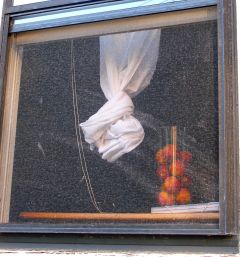
When George W. Bush nominated Harriet Miers to the Supreme Court, it was an obvious opportunity to discuss the philosophy of Martin Buber, however briefly.
Actually, I've had this entry on the bench for a number of weeks, but I just couldn't find a graceful way to segue to it from my current obsession with avian flu. HAPPY PANDEMIC FLU AWARENESS WEEK, by the way. How was that for graceful?
Upon examination of the news photos of the announcement, I think we can all see, from the adoring look in Harriet's emphacized eyes, as well as from her statement that the president is the most brilliant man she ever met, that she is in the idealization phase of her relationship with W. W. is heavily into idealization too. Just look at what happens to those who differentiate.
I discussed idealization and differention some time ago in my wedding phase, before I started viewing myself as such dedicated public servant.
Differentiation is the process in which we first observe, then, hopefully, learn to appreciate, the unique differences another person brings to a relationship. Since I did such a good job explaining it before, I shall have to insist you read under the clickie for further elucidation.
Martin Buber takes the concept differentiation to a higher realm. He "is best known for his philosophy of dialogue, a religious existentialism centered on the distinction between direct, mutual relations (called by him the "I-Thou" relationship, or dialogue), in which each person confirms the other as of unique value, and indirect, utilitarian relations (designated the "I-It" relationship, or monologue), in which each person knows and uses others but does not really see or value them for themselves. In the former, a true dialogue exists because the I interrelates totally with the Thou, creating a union, a bonding, between the two. The I-Thou relationship involves risks, because total involvement cannot calculate injuries that may be inflicted on the I by the Thou. Human relationships can only approximate the perfect I-Thou dialogue. When people are in a genuine dialogue with God (the only perfect Thou), the true I-Thou relationship is present."
I am of the opinion that George W. has an "I-it" relationship with just about everyone, including God. I do not think he suffers differentiation lightly-- worshipful sycophancy is his preference. With the exception of his trainer, Karl-- that's probably more an "It-I" relationship. Speaking of KR, wonder what's happening in the high treason department?
I, of course, welcome the I-thou anytime. Just try to be gentle. I fear that I have driven away all my dear readers with my perseveration on the topic of avian flu. The high price of differentiation, I guess.
Visit a Buberish God at Blaugustine
Photo note: Curtains and oranges are certainly different from one another. That's about as far as I've gotten. To be honest, I just like the shot. When it's big, it's full of moire.
October 02, 2005
Corridor

Yesterday I went to visit a real life artist photographer. His studio is right around the corner from my office, and a mutual friend suggested I meet him. He has a printer the size of a harpsichord, a wonderful eye, a generous heart and a houseful of beautiful architectual (for the moment) photographs. The corridor of his office building is right out of Raymond Chandler (see above).
I have been swimming in the sea of synchronicity for a couple of days.
On Friday, my second oldest friend and college roommate came up from Manhattan. (My oldest, though not dearest, friend will probably continue not speaking to me until well after Bush is impeached, since she is married to the right wing fascist that I attacked in the lobby of a Spanish restaurant last year, screaming the little white lie that I just contributed $5000 to the ACLU because of thinking like his. So much for truth and couth. )
In any case my CR and I visited my nutritionist, (Angel, and Proprietor of Inner Nourishment), together on Friday. There was much work to be done and undone, and we just barely squashed it into two hours. My nutritionist felt, at first, that she needed to be discreet about her consultations from above, but eventually she let it rip and had those divining rods spinning. CR felt more physically comfortable afterward, and was relieved to have been heard and respected as an expert in her own healing, and not to have to have staved off an assault by a narcissistic healer (there are far too many, especially in NYC -- just watch Oprah)
Afterwards, she wanted to visit our old quarters, which remain intact, above a Chinese restaurant in Harvard Square. (Back then, the location was both a blessing for its convenience, and a curse for its cockroaches.)
Harvard Square, especially when bestudented, is THE most impossible place to park in a city of impossible parking.
As we pulled into the Square, there was a car accident to our right. A fire truck was coming around the corner, and I had to squeeze left to let it pass. I pulled over in to a legal parking space, right in front of our destination. Glancing at the accident, CR said "This reminds me of the scene in Martha Beck's book ('Expecting Adam'), where she's pregnant, and she witnesses an accident in Harvard Square -- it's just like that!". ( I wasn't quite sure what scene CR was taking about, but think it was a big part of Martha's introduction to the woowoo. I shall have to reread it)
CR went on to have a brief flirtation with the clerk at the Coop, (a twenty five year old musician, whom we knew immediately was only cashiering for his medical insurance). CR doesn't usually allow herself brief flirtations, especially with much younger men, but this one was a singer, like herself. Besides, after you've been internally nourished, they tend to flock around you.
Leaving the Coop, we literally bumped into the youngest of my nearest and dearest, whom I hadn't seen in a month. He was headed to NYC on the Chinatown bus and walked us down the avenue for several blocks. CR is as close to an auntie that he has, as a result of my state of onlychildness. I thought that was alot of synchronicity for one day.
IMPORTANT NEW INFORMATION - IF YOUR POWER OF CONCENTRATION IS THIN, START HERE
Yesterday there was a comment on my Avia Flu Preparedness List from Jonathan Byron, (aka " Root" over at med-owl .com)
author of "H5N1 Avian Flu Virus Therapy: Conventional and Herbal Options" as well as a list of herbal treatment possiblities, (see especially NAC) including a most important discussion of the question Do we really want to stimulate the immune system?"
Photo note: Think metaphorophotograpically. Notice that the sign at the end of the hall reads "No Exit". This is the only shot I took all day that was in focus --that doesn't happen so much anymore. I think it was meant to be published.